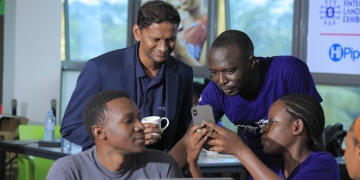
A total of four thousand tablet devices are being given away to 4,000 households across Uganda, as part of a Uganda Communications Universal Services and Access Fund (UCUSAF) proof – of concept on the necessity and role of access and usage of ICTs in eradicating household poverty.
The proof-of-concept project, through which some of the poorest households in the country receive free solar-powered tablet devices, is an extension of the first phase in which 1,444 households from seven districts benefited, in November 2021. The first phase beneficiary districts were: Kayunga, Buvuma, Butaleja, Amudat, Kotido, Kanungu and Buliisa.
This phase of the project is targeting 25 villages from 25 districts to extend the sample size from phase 1. The 25 villages were selected basing on the National Household Survey conducted by the Uganda Bureau of Statistics (UBOS) in 2016/17 and a USAID report on district GDP per capita in 2017.
The districts include Moyo, Lamwo, Pader, Kumi, Sironko, Namisindwa, Kaabong, Napak, Katakwi, Amuria, Otuke, Alebtong, and Kagadi. Others are: Ntoroko, Bundibugyo, Butambala, Namayingo, Kibuku, Kaliro, Kalangala, Agago, Nwoya, Kaberamaido, Ngora, and Bukedea.
The project is a demand side intervention that seeks to empower consumers with low-cost internet enabled devices to stimulate ICT access and usage in the beneficiary communities.
The tablets are loaded with data for the 1st 6 months at the end of which the expectation is that the beneficiaries will have experienced the value in access to ICTs and the internet and therefore load the airtime and data consequently.
Besides driving acquisition and usage of ICTs in the selected households, the project aims for a corresponding spiral effect on neighbouring households and communities, thereby bridging the digital divide and enhancing access to information for use in poverty-alleviating economic activities, health, education, and positive lifestyle changes.
This project, which includes a basic digital skilling component, complements other interventions such as the ICT for Farmers initiative where UCUSAF is skilling farmers and creating centralized access to various products across the farming value chain in a bid to boost productivity.
Besides digital skilling, the project also works in coordination with telecom service providers to ensure network and service availability.
Operators are also involved in the onsite registration and data loading for six (6) months subscription for every tablet.
Some observations from the monitoring of phase 1 include that some of these households at the end of the 6 months complimentary data have gone ahead to continue loading data on the tablets after experiencing the value of the access to information. In some households, the tablets were taken over by the men with limited access for the women and the children. The limitations in usage due to low levels of literacy and numeracy over and above the digital literacy skilling gaps also presented as a challenge, as most of the resourceful information is available in English
According to the UCC market performance report for the second quarter of 2022, there were 23.7 million broadband connections in Uganda as of June 2022, translating into a broadband penetration of 55 internet connections for every 100 Ugandans. The quarterly report further indicates that the total number of network-connected devices was 36.1 million, with only 10.9m of these internet-enabled while 25 million were feature and basic devices. A feature phone can only offer basic telephony services.
According to UCUSAF projections, higher smart phone penetration would gradually have an impact on ICT adoption and reduction in the cost of internet. Besides, increased use of broadband services in business, health, education, and lifestyle, among others, would help improve people’s standard of living at household level.
The locally assembled devices come with bandwidth for at least six months and relevant content in the fields of education, health, and agriculture. As the project sample size grows, UCC is seeking to use the project outcomes as a base for seeking strategic partnerships to carry this initiative forward with full consideration of all aspects including internet local content drivers, device maintenance programs, upgrade and end of life management.




















